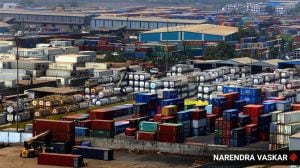Consumers to bear the brunt: Indian Inc
The railways hiked freight charges for iron, coal and cement on Thursday, saying the move repairs imbalances created by it absorbing success...

The railways hiked freight charges for iron, coal and cement on Thursday, saying the move repairs imbalances created by it absorbing successive fuel price hikes. The 3.5 to 7.5 per cent hike effective from Saturday, would negatively impact costs of moving the three commodities by rail and encourage inflation, industry association FICCI protested.
The railways, however, claims a revenue shortage of Rs 600 crore for this fiscal, even though its corrective freight hike will rake in Rs 1,200 by April 2005.
But road transporters were skeptical over chances it could push bulk traffic their way. ‘‘Railways has an 80 to 90 per cent monopoly over bulk transportation. Factories and mines rely on special wagons and infrastructure, only they provide. The hike leaves them no choice but to comply,’’ said J.M. Saxena, President, All India Motor Transport Congress.
Indian Railways said it can absorb no more escalations in steel or diesel, but FICCI and industry demanded rollbacks, saying core steel and thermal power sectors, which consume the most iron ore, cement and coal will push up prices. FICCI said the railways must increase productivity, efficiency, cut costs and hike passenger fares to absorb cost escalation. Core sector players said their costs will go up for consumers.
‘‘There will be some impact on the overall cost,’’ said Arvind Parikh, Director Finance, Jindal Strips.
B.V.R. Subbu, president, Hyundai Motor India said, ‘‘The impact of steel price hikes is very, very marginal on my production costs. It is my transportation prices that I will have to look at.’’
Subbu said if steel prices are up 3 per cent a tonne and freight costs go up around 10 per cent, the impact on carmakers would be minimal, as half the auto sector’s steel is imported.
‘‘The 3.7 per cent hike in cement freight and 7.7 per cent for coal will also push up cement costs. Regional differences will crop up in the impact, depending on the distance covered by the cement consignments — and the level of coal usage. Gujarat Ambuja and ACC had hiked cement prices in the western region by Rs 5 a bag on Tuesday.
ACC executive director-marketing, AK Jain said, about 50 per cent of the company’s cement is transported by rail and the freight hike will definitely have an adverse impact, which will be passed onto consumers. Grasim Industries said inputs costs will go up tremendously with the increase in cement freights rates.
Photos





- 01
- 02
- 03
- 04
- 05

























